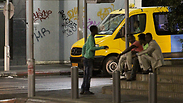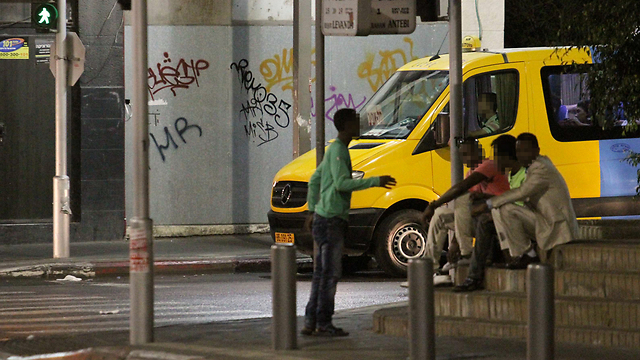
The data shows that in 2017, Eritreans and Sudanese nationals had 4.3 times more sex crime cases, 3.5 times more violent crime cases, and 3.1 times more theft and damage to property cases than the general public. The information was obtained through a freedom of information request to the Israeli Immigration Policy Center (IIPC).
In addition, Sudanese and Eritrean migrants had 3.4 times more sexual offense cases, 3.3 times more property offense cases and 3.1 times more violence offense cases than the rest of the foreign population in Israel.
The police refused to provide any data about murder cases.
The Israeli Immigration Policy Center compared between the number of cases in which a Sudanese or Eritrean national is suspected of sexual, property and violence offenses and the cases in which suspects were not foreign nationals, according to police statistics in 2017.
"Police statistics shows that the rate of Sudanese and Eritrean asylum-seekers involved in crime is higher than their relative part in the population," as noted in the Immigration Policy Center's report.
"In addition, these crime offenses gravely influence the population's sense of personal security, as opposed to white collar offenses and tax offenses. It is important to stress that in some cases, the Sudanese and Eritrean population is involved in severe crime, which Israeli society is not accustomed to, such as the assault and rape of the elderly, eight-year-old girls, and disabled women. Therefore, these crimes are enough to create an atmosphere of fear, especially in neighborhoods like south Tel Aviv, with a high percentage of asylum seekers," the Immigration Policy Center added.
Yonatan Yakobovich, the director of the Immigration Policy Center, said: "It's about time to put an end to the false information being disseminated about foreign nationals. The data we've received from the police unequivocally proves that the crime rate among the infiltrators is significantly higher than their proportion of the population, and the nature of these offenses influences Israeli citizens' sense of personal safety.
"The legal and law enforcement system must allocate the proper budgets to handle this phenomenon, to strengthen punitive measures in order to create deterrence, and to enforce the law that states that infiltrators who constitute a danger to public safety will be transferred to the Saharonim facility until their deportation from the country," Yakobovich added.
It is important to note that most Sudanese and Eritrean nationals in Israel are young men, a demographic with a crime rate higher than the general population in any event.
State Comptroller Joseph Shapira's annual report, released in May, outlined the complex reality and hardship faced by the African migrants, who mainly reside in southern Tel Aviv. The financial distress, the lack of access to health and welfare services, the crowded quarters without basic infrastructures are the reasons many of the migrants turn to crime.
The limited access of certain patients to health services and the ramifications of the Welfare Ministry's policy on needy asylum seekers casts doubt over whether the government's actions to provide them with the basic means to live with dignity are in line with the Basic Law: Human Dignity and Liberty.
Prof. Shlomo Mor Yosef, Director General of the Population and Immigration Authority, said the Knesset State Control Committee was still waiting for the transfer of a NIS 28 million budget to provide welfare and health services for Sudanese and Eritrean nationals.
Committee chairwoman and Zionist Union MK Shelly Yachimovich added: "The government doesn't have an independent policy on the matter. On the one hand, asylum seekers are not being deported from Israel, but on the other hand the state won't acknowledge them. This is both a moral and constitutional issue, which obligates us as a country to treat this population. They are human beings who live among us."
Yuval Hayo, deputy director-general of the State Comptroller's Office, criticized the way government offices have handled the issue.
"The committee's recommendations provide a limited solution, but it lacks the proper funding for the problems presented in the state comptroller's report."


















